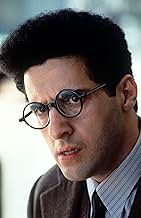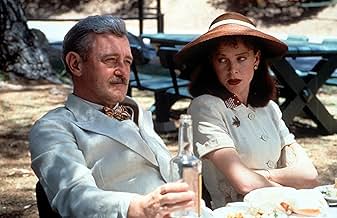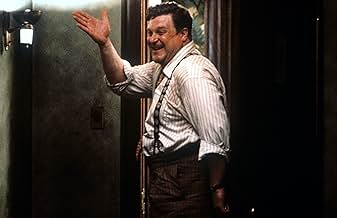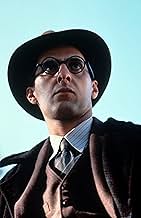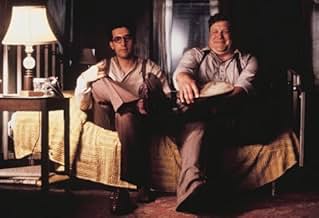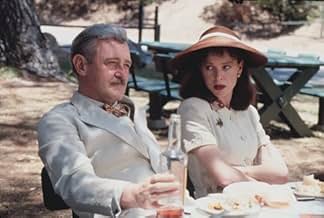Barton Fink
- 1991
- Tous publics
- 1h 56min
Un dramaturge renommé de New York est convié en Californie pour écrire des scénarios de film : il y découvrira le revers de la médaille hollywoodienne.Un dramaturge renommé de New York est convié en Californie pour écrire des scénarios de film : il y découvrira le revers de la médaille hollywoodienne.Un dramaturge renommé de New York est convié en Californie pour écrire des scénarios de film : il y découvrira le revers de la médaille hollywoodienne.
- Réalisation
- Scénario
- Casting principal
- Nommé pour 3 Oscars
- 19 victoires et 29 nominations au total
Meagen Fay
- Poppy Carnahan
- (as Megan Faye)
Avis à la une
While many of us know "Fargo" and "Big Lebowski", many fans still haven't heard of "Barton Fink", which is too bad. This is probably John Turturro's best role (and his least weird). Tony Shalhoub also gives an outstanding performance (at least as good as he was in "The Siege").
John Goodman? Heck, even he is pretty good here and I'm not a big fan of his (though the Coen Brothers do him justice like no others can). His portrayal of the questionable neighbor just really suits him.
There is supposed to be deep symbolism in this film -- some say it's an allegory for the rise of Nazism (and I can see that), while others say it's just a critique of Hollywood. I don't know. But, you know what? No matter what it's about, it's beautiful in a nihilistic way... and you will want to know: what's in the box? And I'm not going to tell you.
John Goodman? Heck, even he is pretty good here and I'm not a big fan of his (though the Coen Brothers do him justice like no others can). His portrayal of the questionable neighbor just really suits him.
There is supposed to be deep symbolism in this film -- some say it's an allegory for the rise of Nazism (and I can see that), while others say it's just a critique of Hollywood. I don't know. But, you know what? No matter what it's about, it's beautiful in a nihilistic way... and you will want to know: what's in the box? And I'm not going to tell you.
I'm still not entirely sure what to think of this film. One thing is sure, it won't be easy to forget. This movie is clearly the product of a writer who has struggled with their muse, and equally one who has a healthy mistrust of Hollywood - the sausage grinder. Although Hollywood has been critiqued in film before in similar ways, memorable scenes, clever dialogue, quality acting, and a surreal plot and setting, add together to make this an unusual and different film. Maybe another viewing might add a different dimension. This is by no means 'light entertainment' and it leaves plenty of questions unanswered. But on the whole, an intelligent movie, if something of an enigma. My vote 7/10
You are either going to love or hate this one, and I doubt you'll know which until it's over. Maybe you won't know even then.
In 1941, Barton Fink (John Turturro) is a successful Broadway playwright. Now that he's got some success under his belt, he says he wants to write plays for "the common man". But his agent has a tempting offer. A movie studio wants him to come to LA and write screenplays for 1000 dollars a week. The agent convinces him to go. Barton checks into the Hotel Earle, which has ornate decorations in the common areas, but is a dump from the standpoint of Barton's room. The heat has the wallpaper peeling off the walls. The sole decoration in Barton's room is the picture of a woman sitting on the beach, her arm raised to block the sun. Remember this picture - it's important.
Barton's first assignment is to write a "wrestling picture" starring Wally Beery. But Barton has writer's block for assorted reasons, one of them being that he knows nothing about this subject. So he stares at his typewriter with the dread an insomniac might stare at his bed. But then what seemed to start out being a film about how the studio system can beat the creativity and the confidence out of a successful writer changes course and becomes something that is completely surreal and even nightmarish by the end. I can really say nothing more specific than that without giving things away.
The Coens wrote Barton Fink when they were having writer's block trying to write Miller's Crossing because of the complexity of the plot. So did they manage to pack lots of symbolism into a tight, coherent package, or did they simply let their imagination run wild and undisciplined in an attempt to get back on track on the other film? I have no idea. I just know that I like it and - for me - it's great for repeat viewings.
One more thing - How can it be so hot in LA, and then suddenly WWII has started, which would make it December? Why is it Barton doesn't seem to notice WWII has started without being told and then really has no reaction. He really isn't plugged into "the common man" is he?
In 1941, Barton Fink (John Turturro) is a successful Broadway playwright. Now that he's got some success under his belt, he says he wants to write plays for "the common man". But his agent has a tempting offer. A movie studio wants him to come to LA and write screenplays for 1000 dollars a week. The agent convinces him to go. Barton checks into the Hotel Earle, which has ornate decorations in the common areas, but is a dump from the standpoint of Barton's room. The heat has the wallpaper peeling off the walls. The sole decoration in Barton's room is the picture of a woman sitting on the beach, her arm raised to block the sun. Remember this picture - it's important.
Barton's first assignment is to write a "wrestling picture" starring Wally Beery. But Barton has writer's block for assorted reasons, one of them being that he knows nothing about this subject. So he stares at his typewriter with the dread an insomniac might stare at his bed. But then what seemed to start out being a film about how the studio system can beat the creativity and the confidence out of a successful writer changes course and becomes something that is completely surreal and even nightmarish by the end. I can really say nothing more specific than that without giving things away.
The Coens wrote Barton Fink when they were having writer's block trying to write Miller's Crossing because of the complexity of the plot. So did they manage to pack lots of symbolism into a tight, coherent package, or did they simply let their imagination run wild and undisciplined in an attempt to get back on track on the other film? I have no idea. I just know that I like it and - for me - it's great for repeat viewings.
One more thing - How can it be so hot in LA, and then suddenly WWII has started, which would make it December? Why is it Barton doesn't seem to notice WWII has started without being told and then really has no reaction. He really isn't plugged into "the common man" is he?
I liken the Coen brothers to Haagen-Daz ice cream, i.e., various stages of good. I would argue this dark film, laden with more allegories than Dante, is not their best...but, it's good, damn good. To begin with, stellar performances form Turturro, Goodman, Mahoney, Buscemi and Lehner. The thing I find amazing is the skill in bringing so much darkness to such a bright, colorful cinemagraphic work-- remindful of Ingmar Bergman's Cries and Whispers, in that regard-- that teeters on the edge. Goodman's last scene walking into the burning hotel room is eerie but very bright (why not? The damn place is burning down.) This is another great Coen brother film and let's hear it for Ethan and Joel! See it!
I knew I was entering the world of the insane when I picked this up. I wasn't disappointed. This is a dark comedy where people don't talk to each other, they just talk. Barton Fink is a big phony one hit wonder. He has these high ideals which he really doesn't understand. He's unable to see the forest for the trees. When he meets John Goodman's character, Charlie, he has an opportunity to find his muse, but he doesn't even listen. When he does, it's too late. The events of this film are wonderful, from Barton's speeches and his block. To Mayhew, the ersatz Faulkner, who drinks constantly and screeches. Barton Fink is so unlikeable that we don't even care what happens to him in other than a casual way. Goodman steals every scene he is in and ends up so much more that originally thought. This is a movie about taking everything to a higher pitch. It's about the artist and the dilettante. It's about the movies being a purely commercial enterprise. Wallace Beery is the king of the screen. It's a wrestling movie. For God's sake, they're asking for so little. Barton Fink is a whiny loser and he pays the price. The Coens are, without a doubt, the most refreshing thing of the last two decades.
Le saviez-vous
- AnecdotesThe first film to win all three major awards (Palme D'or, Best Director, and Best Actor) at the Cannes Film Festival. Also, it was unanimously chosen for the Palme D'or.
- GaffesBriefly visible at the top of the screen when Detective Mastrionotti introduces himself to Barton.
- Citations
Charlie Meadows: Look upon me! I'll show you the life of the mind!
- Crédits fousThe 20th Century Fox logo appears over silence; the "fanfare" is not played.
- ConnexionsEdited into The Clock (2010)
- Bandes originalesFor Sentimental Reasons
by Edward Heyman, Al Sherman and Abner Silver
Licenced with Permission the Successors of Marlo Music Corporation (ASCAP)
Meilleurs choix
Connectez-vous pour évaluer et suivre la liste de favoris afin de recevoir des recommandations personnalisées
Détails
- Date de sortie
- Pays d’origine
- Langue
- Aussi connu sous le nom de
- Бартон Фінк
- Lieux de tournage
- Sociétés de production
- Voir plus de crédits d'entreprise sur IMDbPro
Box-office
- Budget
- 9 000 000 $US (estimé)
- Montant brut aux États-Unis et au Canada
- 6 153 939 $US
- Week-end de sortie aux États-Unis et au Canada
- 268 561 $US
- 25 août 1991
- Montant brut mondial
- 6 154 231 $US
- Durée
- 1h 56min(116 min)
- Couleur
- Mixage
- Rapport de forme
- 1.85 : 1
Contribuer à cette page
Suggérer une modification ou ajouter du contenu manquant




